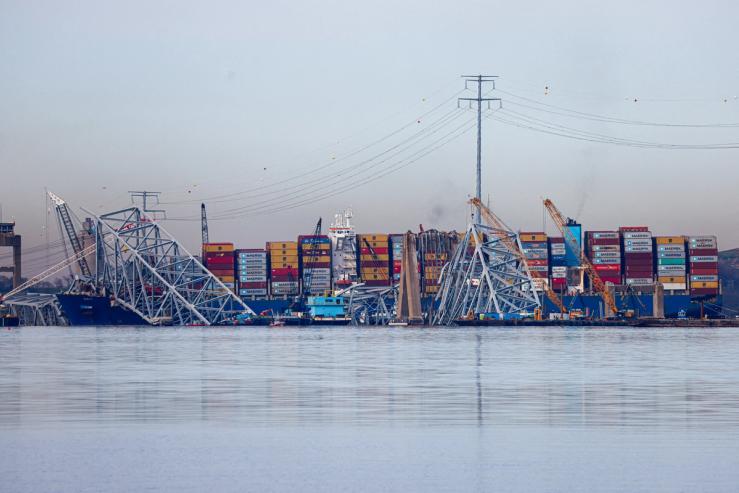The News
Seven weeks after a container ship crashed into Baltimore’s Francis Scott Key Bridge, the ship’s nearly two dozen crew members are still trapped aboard. Six people on the bridge were killed in the March 26 collision, which essentially destroyed the iconic structure. The toll could have been higher, investigators said at the time, but the crew issued an emergency alert that allowed authorities to close the bridge to cars minutes before impact.
The crew, made up of 20 Indian nationals and one Sri Lankan, are stuck due to both visa issues and the ongoing investigations by the US National Transportation Safety Board and FBI, the BBC reported. They also have to keep the ship operable as it is extracted from the debris. Authorities began demolishing the remaining parts of the bridge this week in an effort to free the ship, though it remains unclear when or if the crew will be allowed to disembark while the investigations continue.
“The crew members have been one of our top priorities,” said Darrell Wilson, a spokesperson for the ship’s management company, Synergy Marine. He said members of the embassies of India and Sri Lanka have visited them, as well as seafarer assistance groups.
SIGNALS
Unions concerned about potential ‘criminalisation’ of crew members
The FBI has launched a criminal investigation into the circumstances leading up to the collapse, and crew members are reportedly experiencing emotional distress and the “unfounded fear of personal criminal liability” for the incident, two seafarers unions said in a statement. “The criminalisation of seafarers based solely on their position on board a vessel during an incident is a growing concern,” said Mary Liew, general secretary for the Singapore Maritime Officers Union. The crewmen have also raised concerns that being detained on the ship could imperil future efforts to secure US visas for themselves or their children.
Seafarers’ unions call for the return of confiscated cell phones
Investigators confiscated the crew members’ cell phones, and although they’ve received replacements, advocates say they were left without important contacts and are unable to transfer money home or pay bills online. “However long the investigation takes, the crew’s rights and welfare should not be infringed upon during its course,” said David Heindel, president of the Seafarers International Union, calling on authorities to return their phones. Several other unions that advocate for seafarers and other transportation workers have issued the same call.
Action is needed to prevent future disasters, Coast Guard says
The federal agencies that responded to the disaster told Congress on Wednesday “the country needs to take steps to address the risks large ships pose to the country’s essential infrastructure,” The Washington Post reported. As part of that effort, the US Coast Guard is helping convene a national board of inquiry to assess the risk-management tools and regulatory systems to keep ports safe. The day before the bridge collision, the ship suffered two electrical blackouts, and then experienced two more blackouts just before the crash. The losses of electricity disabled critical equipment, federal safety investigators said in a preliminary report released this week. The report did not indicate whether investigators thought the crew or the ship’s owners had done anything wrong.



